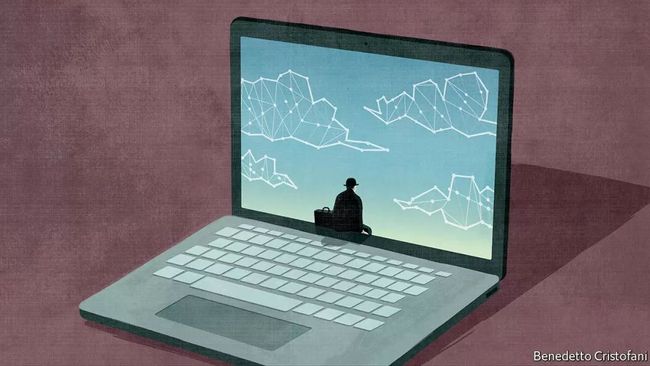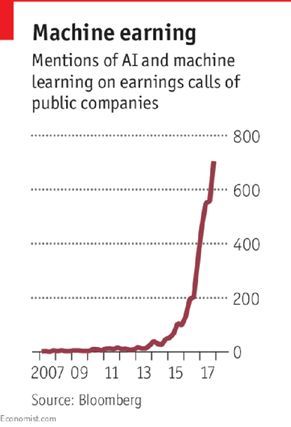Artificial intelligence is spreading beyond the technology sector, with big consequences for companies, workers and consumers, says Alexandra Suich Bass
Mar 28th 2018
LIE DETECTORS ARE not widely used in business, but Ping An, a Chinese insurance company, thinks it can spot dishonesty. The company lets customers apply for loans through its app. Prospective borrowers answer questions about their income and plans for repayment by video, which monitors around 50 tiny facial expressions to determine whether they are telling the truth. The program, enabled by artificial intelligence (AI), helps pinpoint customers who require further scrutiny.
AI will change more than borrowers’ bank balances. Johnson & Johnson, a consumer-goods firm, and Accenture, a consultancy, use AI to sort through job applications and pick the best candidates. AI helps Caesars, a casino and hotel group, guess customers’ likely spending and offer personalised promotions to draw them in. Bloomberg, a media and financial-information firm, uses AI to scan companies’ earnings releases and automatically generate news articles. Vodafone, a mobile operator, can predict problems with its network and with users’ devices before they arise.Companies in every industry use AI to monitor cyber-security threats and other risks, such as disgruntled employees.
Instead of relying on gut instinct and rough estimates, cleverer and speedier AI-powered predictions promise to make businesses much more efficient. At Leroy Merlin, a French home-improvement retailer, managers used to order new stock on Fridays, but defaulted to the same items as the week before so they could start their weekend sooner. The firm now uses algorithms to take in past sales data and other information that could affect sales, such as weather forecasts, in order to stock shelves more effectively. That has helped it reduce its inventory by 8% even as sales have risen by 2%, says Manuel Davy of Vekia, the AI startup that engineered the program.
pinpoint: to find out something with certainty
disgruntled: unhappy and annoyed
AI 人工智能在各行各业都有很大的作用,中国平安用人工智能分析它的借贷的客户,分析所说的话是否真实可靠;赌场和酒店集团用人工智能分析客人的消费能力,量身定做宣传广告来吸引他们;Bloomberg用人工智能分析公司的财报然后自动形成报告...
AI and machine learning (terms that are often used interchangeably) involve computers crunching vast quantities of data to find patterns and make predictions without being explicitly programmed to do so. Larger quantities of data, more sophisticated algorithms and sheer computing power have given AI greater force and capability. The outcomes are often similar to what an army of statisticians with unlimited time and resources might have come up with, but they are achieved far more quickly, cheaply and efficiently.
One of AI’s main effects will be a dramatic drop in the cost of making predictions, says Ajay Agrawal of the University of Toronto and co-author of a new book, “Prediction Machines”. Just as electricity made lighting much more affordable—a given level of lighting now costs around 400 times less than it did in 1800—so AI will make forecasting more affordable, reliable and widely available.
Computers have been able to read text and numbers for decades, but have only recently learned to see, hear and speak. AI is an omnibus term for a “salad bowl” of different segments and disciplines, says Fei-Fei Li, director of Stanford’s AI Lab and an executive at Google’s cloud-computing unit. Subsections of AI include robotics, which is changing factories and assembly lines, and computer vision, used in applications from identifying something or someone in a photo to self-driving-car technology.Computer vision is AI’s “killer app”, says Ms Li, because it can be used in so many settings, but AI has also become more adept at recognising speech. It underlies voice assistants on phones and home speakers and allows algorithms to listen to calls and take in the speaker’s tone and content.
omnibus: of, relating to, or including many things
Techtonic shifts
Until now the main beneficiary of AI has been the technology sector. Most of today’s leading tech firms, such as Google and Amazon in the West and Alibaba and Baidu in China, would not be as big and successful without AI for product recommendations, targeted advertising and forecasting demand. Amazon, for example, uses AI widely, for tasks such as guiding robots in its warehouses and optimising packing and delivery, as well as detecting counterfeit goods and powering its speaker, Alexa. Alibaba, a Chinese rival, also makes extensive use of AI, for example in logistics; and its online-payments affiliate, Ant Financial, is experimenting with facial recognition for approving transactions. Sundar Pichai, Google’s boss, has said that AI will have a “more profound” impact than electricity or fire.
Bosses of non-tech companies in a broad range of industries are starting to worry that AI could scorch or even incinerate them, and have been buying up promising young tech firms to ensure they do not fall behind. In 2017 firms worldwide spent around $21.8bn on mergers and acquisitions related to AI, according to PitchBook, a data provider, about 26 times more than in 2015 (see chart). They are doing this partly to secure talent, which is thin on the ground. Startups without revenue are fetching prices that amount to $5m-10m per AI expert.
scorch: to burn the surface of something
incinerate: to burn something completely
AI人工智能一般都对科技寡头们有比较大的贡献,而各行各业的老板们都担心AI使他们落后于人,所以都在花钱并购一些刚起步的科技公司,确保自己不被甩开太远...
As AI spreads beyond the tech sector, it will fuel the rise of new firms that challenge incumbents. This is already happening in the car industry, with autonomous-vehicle startups and ride-hailing firms such as Uber. But it will also change the way other companies work, transforming traditional functions such as supply-chain management, customer service and recruitment.
The path ahead is exhilarating but perilous. Around 85% of companies think AI will offer a competitive advantage, but only one in 20 is “extensively” employing it today, according to a report by MIT’s Sloan Management Review and the Boston Consulting Group. Large companies and industries, such as finance, that generate a lot of data, tend to be ahead and often build their own AI-enhanced systems. But many firms will choose to work with the growing array of independent AI vendors, including cloud providers, consultants and startups.
This is not just a corporate race but an international one, too, especially between America and China. Chinese firms have an early edge, not least because the government keeps a vast database of faces that can help train facial-recognition algorithms; and privacy is less of a concern than in the West.
这场人工智能竞赛不只是公司之间的比赛,也是一场国际大战,尤其是中国和美国之间的较量。中国的公司有较大的优势,政府掌握了大量的脸部数据可以训练完善人脸识别算法,而且隐私在中国是比较容易忽略的事情...(百度李彦宏说的那个话,引起轩然大波)
There will be plenty of opportunities to stumble. One difficult issue for companies will be timing. Roy Bahat of Bloomberg Beta, a venture-capital firm, draws a parallel between now and the first dotcom boom of the late 1990s: “Companies are flailing to figure out what to spend money on.” If they invest huge sums in AI early on, they run the risk of overcommitting themselves or paying large amounts for worthless startups, as many did in the early days of the internet. But if they wait too long, they may leave themselves open to disruption from upstarts, as well as from rivals that were quicker to harness technology.
Some may have been misled by glowing media reports, believing AI to be a magic wand that can be installed as easily as a piece of Microsoft software, says Gautam Schroff of Tata Consultancy Services, an Indian firm. AI systems require thorough preparation of data, intensive monitoring of algorithms and a lot of customisation to be useful.Gurdeep Singh of Microsoft speaks of AI systems as “idiots savants”; they can easily do jobs that humans find mind-boggling, such as detecting tiny flaws in manufactured goods or quickly categorising millions of photos of faces, but have trouble with things that people find easy, such as basic reasoning. Back in 1956, when academic researchers held their first gathering to discuss AI, they were looking for a way to imbue machines with human-like “general” intelligence, including complex reasoning. But that remains a distant aspiration.
The excitement around AI has made it hard to separate hype from reality. In the last quarter of 2017 public companies across the world mentioned AI and machine learning in their earnings reports more than 700 times, seven times as often as in the same period in 2015 (see chart). There are so many firms peddling AI capabilities of unproven value that someone should start “an AI fake news” channel, quips Tom Siebel, a Silicon Valley veteran.
stumble: to hit your foot on something when you are walking or running so that you fall or almost fall: trip
imbue: to cause someone or something to be deeply affected by a feeling or to have a certain quality
Bosses must keep several time horizons in mind. In the near future AI will reshape traditional business functions such as finance, HR and customer service, according to Michael Chui of the McKinsey Global Institute, a think-tank within a consultancy. But over time it will also disrupt whole industries, for example by powering the rise of autonomous vehicles or the discovery of entirely new drug combinations. Whereas humans may have preconceptions about which product designs or drug combinations are likely to work best, algorithms are more likely to come up with novel solutions.
In private, many bosses are more interested in the potential cost and labour savings than in the broader opportunities AI might bring, says John Hagel of Deloitte, a consultancy. That is certainly not good for workers, but nor, ultimately, is it good for business. “If you just cut costs and don’t increase value for customers, you’re going to be out of the game,” he says. Some companies may not actually eliminate existing jobs but use technology to avoid creating new ones. And workers who keep their jobs are more likely to feel spied on by their employers. Some firms already use AI to comb through their workers’ communications to ensure that they are not breaking the law. Such practices will spread, raising privacy issues.
A longer-term concern is the way AI creates a virtuous circle or “flywheel” effect, allowing companies that embrace it to operate more efficiently, generate more data, improve their services, attract more customers and offer lower prices. That sounds like a good thing, but it could also lead to more corporate concentration and monopoly power—as has already happened in the technology sector.
novel: adj~ new and different from what has been known before
点评: 人工智能将发展成怎么样,都是这几年全世界的热点,作为普通人的我们,该如何应对,该如何切入,是应该值得思考的事情
--------------------------------------------------------------------------------------------------------------------
Results
Lexile®Measure: 1300L - 1400L
Mean Sentence Length: 22.18
Mean Log Word Frequency: 3.08
Word Count: 1350
这篇文章的蓝思值是在1300-1400L, 是经济学人里比较难的文章~
使用kindle断断续续地读《经济学人》三年,发现从一开始磕磕碰碰到现在比较顺畅地读完,进步很大,推荐购买!点击这里可以去亚马逊官网购买~


